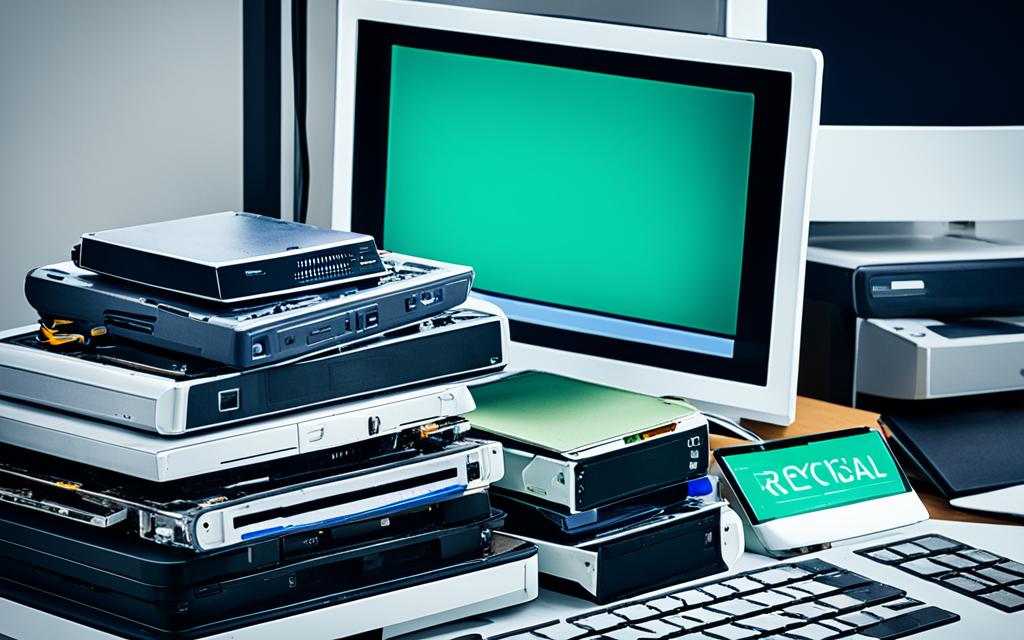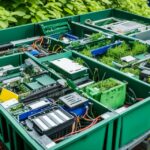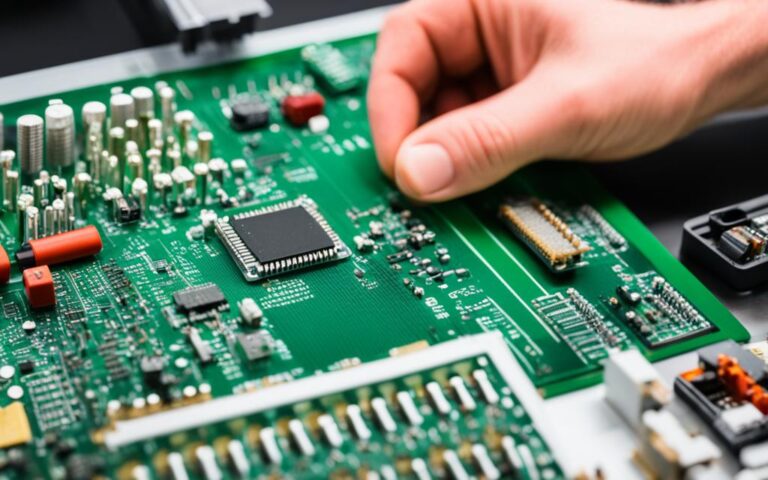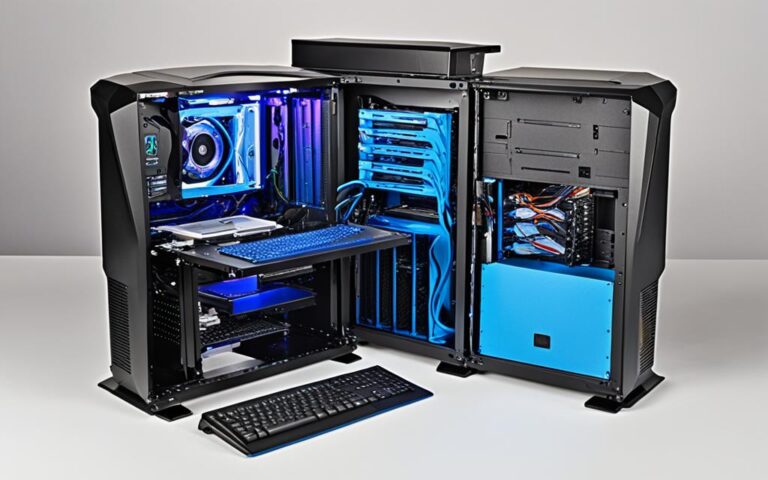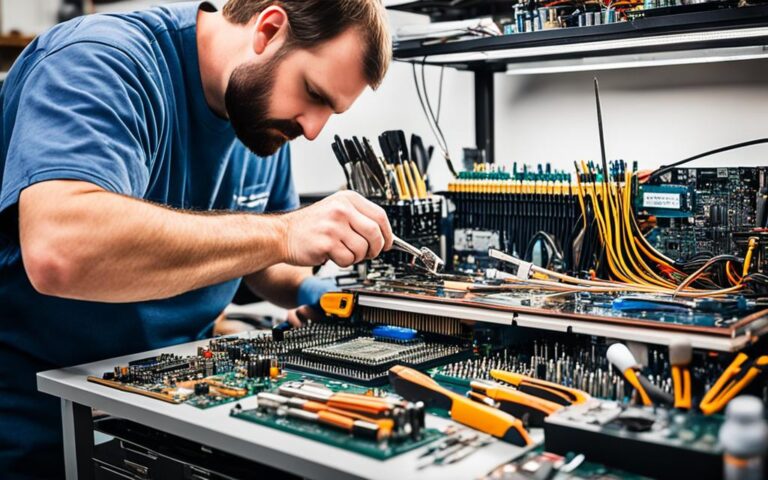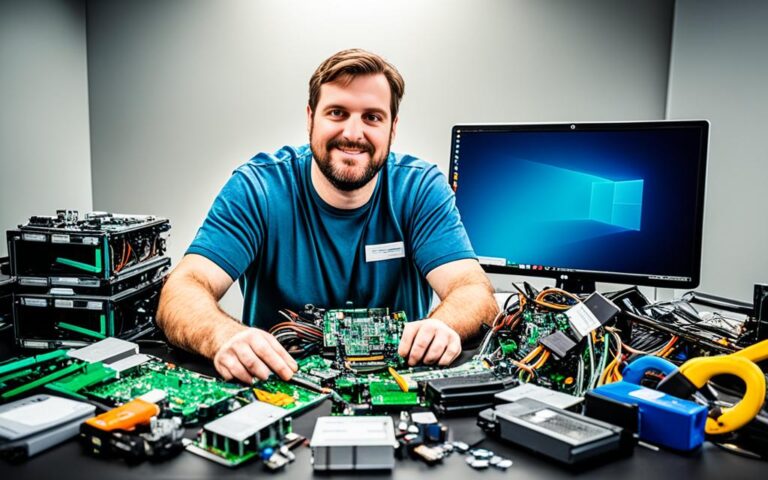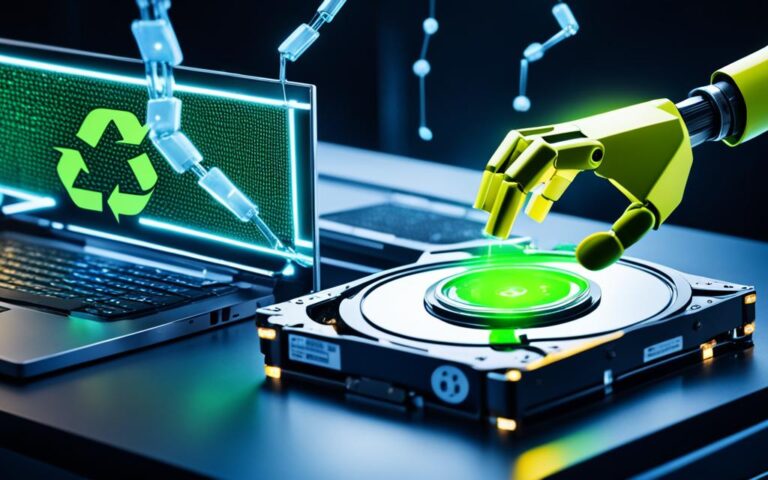Building a Better World with Desktop Recycling Programs
In our quest for a sustainable future, desktop recycling programs play a crucial role in promoting eco-friendly solutions. Companies like Microsoft, together with its hardware partners, are actively working towards reducing the environmental impact of the IT industry.
Microsoft, a global technology leader, has committed to becoming a carbon-negative, water-positive, and zero-waste company by 2030. They are collaborating with Windows 11 PC partners to address sustainability objectives, including improved energy efficiency, sustainable packaging, increased recyclability, and the use of recycled materials. Windows 11 further offers power savings settings and the ability to schedule software updates during times of lower carbon emissions.
As part of this commitment, Microsoft’s hardware partners, such as Acer, ASUS, Dell, HP, Lenovo, Panasonic, and Samsung, are incorporating sustainable practices into their devices. They are actively using recycled materials, sustainable packaging, and innovative design techniques to create eco-friendly products.
By embracing desktop recycling programs and promoting sustainable practices, we can pave the way for a brighter and greener future. Together, we can build a better world for generations to come.
Microsoft’s Commitment to Sustainability
As a leader in the technology industry, Microsoft is dedicated to shaping a sustainable future. They have set ambitious sustainability objectives to be achieved by 2030, including becoming carbon negative, water positive, and zero waste. To realize these goals, Microsoft is collaborating with its PC partners, addressing various aspects of sustainability.
Addressing Sustainable Objectives
Microsoft and its partners are working towards six specific sustainability objectives:
- Improved Energy Efficiency: Microsoft aims to enhance the energy efficiency of its products, reducing energy consumption and minimizing their carbon footprint. This includes optimizing power management settings and developing energy-saving features for Windows 11.
- Sustainable Packaging: The company recognizes the importance of sustainable packaging and strives to implement eco-friendly packaging solutions that reduce waste and promote recyclability.
- Increased Recyclability and Use of Recycled Materials: Microsoft is committed to designing products that are easier to recycle and integrating a higher percentage of recycled materials in their hardware.
- Improved Repairability: Enhancing the repairability of devices helps extend their lifespan and reduces electronic waste. Microsoft encourages repairability through design choices and accessibility features.
- Reduction in Manufacturing Carbon Emissions: By implementing sustainable manufacturing practices, Microsoft aims to minimize carbon emissions associated with the production of their products.
- Promotion of Sustainability Standards and Regulations: Microsoft actively supports and advocates for sustainability standards and regulations, contributing to wider industry adoption of eco-friendly practices.
To highlight their commitment to sustainability, Microsoft has incorporated features into their latest operating system, Windows 11. Users can access power savings settings and schedule software updates during periods of lower carbon emissions, promoting energy conservation.
Striving for a Greener Future
Microsoft’s dedication to sustainability extends beyond their own operations. They actively engage with PC partners to drive eco-friendly initiatives and push for positive change in the industry. By collaborating with leading hardware manufacturers such as Acer, ASUS, Dell, HP, Lenovo, Panasonic, Samsung, and others, Microsoft aims to create a more sustainable technology ecosystem.
Windows 11 is designed with sustainability in mind, offering users both energy-efficient features and a visually immersive experience. The integration of sustainable practices into product development showcases Microsoft’s commitment to building a greener future.
Sustainable Devices from Microsoft’s Hardware Partners
Microsoft’s hardware partners are committed to incorporating sustainable practices into their devices. By prioritizing eco-friendly materials and packaging, these partners are helping to create a more sustainable future. Let’s take a closer look at some of the innovative devices from Microsoft’s hardware partners:
Acer TravelMate Spin P4
Acer’s TravelMate Spin P4 is not only a high-performance laptop but also an eco-conscious choice. Made from recycled materials and EPEAT Gold compliant, this device showcases Acer’s commitment to sustainability.
ASUS Expertbook B9
The ASUS Expertbook B9 offers exceptional performance while minimizing its environmental impact. This carbon-neutral business laptop surpasses ENERGY STAR standards and utilizes recycled metal and FSC Mix-certified paper, making it a sustainable choice for professionals.
Dell Latitude 5000 series
Dell’s Latitude 5000 series is their most sustainable Latitude program yet. With 100% recycled and renewable packaging, Dell ensures that their devices are not only high-quality but also environmentally friendly.
HP Dragonfly G4
The HP Dragonfly G4 is designed with sustainability in mind. Made with recyclable materials and featuring intuitive video conferencing innovations, this device combines functionality with eco-consciousness.
Lenovo ThinkPad Z13
Lenovo’s ThinkPad Z13 showcases their commitment to sustainability. With sustainable materials like recycled aluminum and vegan leather, this device combines style and eco-consciousness.
Panasonic TOUGHBOOK 40
The Panasonic TOUGHBOOK 40 is designed for durability and eco-friendly usage. Its robust construction ensures a long lifespan, reducing electronic waste and contributing to a greener environment.
Samsung Galaxy Book3 Pro 360
Samsung’s Galaxy Book3 Pro 360 is not only a versatile device but also a sustainable one. With its focus on repairability and the use of recycled plastics, Samsung promotes a circular economy and reduces environmental impact.
| Manufacturer | Device | Key Sustainability Features |
|---|---|---|
| Acer | TravelMate Spin P4 | Made from recycled materials and EPEAT Gold compliant |
| ASUS | Expertbook B9 | Carbon-neutral, surpasses ENERGY STAR standards, uses recycled metal and FSC Mix-certified paper |
| Dell | Latitude 5000 series | Ships with 100% recycled and renewable packaging |
| HP | Dragonfly G4 | Made with recyclable materials, intuitive video conferencing innovations |
| Lenovo | ThinkPad Z13 | Sustainable materials like recycled aluminum and vegan leather |
| Panasonic | TOUGHBOOK 40 | Designed for durability and eco-friendly usage |
| Samsung | Galaxy Book3 Pro 360 | Focus on repairability and use of recycled plastics |
These devices from Microsoft’s hardware partners demonstrate a commitment to sustainability and showcase the possibilities of integrating eco-friendly practices into the world of technology. By choosing these sustainable devices, consumers can contribute to a greener future.
Microsoft Authorized Refurbisher Program
In Microsoft’s ongoing commitment to sustainability, they have established the Microsoft Authorized Refurbisher (MAR) program. This program plays a crucial role in extending the life of older devices and reducing electronic waste.
The MAR program allows for the reissue of Windows licenses to refurbished computers, enabling these devices to find new homes and continue their useful life. In 2021 alone, the program issued over 4.8 million Windows licenses, which is an incredible achievement in the pursuit of sustainable usage.
By reusing and recycling millions of devices through the MAR program, Microsoft has made a significant contribution to reducing hazardous waste. In fact, the amount of hazardous waste reduced by these Windows licenses is equivalent to the weight of more than 55,000 refrigerators. This remarkable effort helps protect the environment and promotes sustainable practices.
Through the Microsoft Authorized Refurbisher program, individuals and businesses can access high-quality refurbished computers and enjoy the benefits of sustainable usage. This not only provides affordability but also contributes to a greener future by reducing electronic waste and promoting the circular economy.
The Impact of the Microsoft Authorized Refurbisher Program
The MAR program has far-reaching benefits, both environmentally and economically. Let’s take a look at some of the key impacts:
| Environmental Impact | Economic Impact |
|---|---|
| The reuse and recycling of millions of devices | Affordability of refurbished computers |
| Reduction in hazardous waste | Job creation in the refurbishment industry |
| Contribution to a more sustainable future | Extended lifespan of older devices |
The Microsoft Authorized Refurbisher program is a testament to Microsoft’s commitment to environmental sustainability and responsible technological practices. By choosing refurbished computers from authorized refurbishers, individuals and businesses can make a positive impact while enjoying reliable and affordable computing solutions.
Partner Solutions for Environmental Sustainability
Microsoft partners are at the forefront of developing innovative solutions to drive sustainable environmental practices and contribute to environmental sustainability. Their partner innovations span a wide range of industries, addressing key challenges and leveraging technology to create a greener future.
Honeywell: AI-Automated HVAC Optimization
Honeywell is revolutionizing HVAC operations with AI-automated solutions that optimize energy consumption, reduce emissions, and improve indoor air quality. Their innovative technology ensures efficient use of resources while enhancing comfort and sustainability.
BuildingMinds: Resource Efficiency and Decarbonization
BuildingMinds specializes in improving resource efficiency and decarbonizing buildings. Their cutting-edge solutions enable precise monitoring, analysis, and optimization of energy consumption, waste management, and carbon emissions, leading to significant environmental benefits.
bGrid: IoT for Energy Efficiency
bGrid utilizes the power of the Internet of Things (IoT) to optimize energy efficiency in buildings. Their smart systems seamlessly integrate with existing infrastructure, providing real-time data and intelligent insights that empower businesses to conserve energy and reduce their environmental footprint.
ABB: Optimizing Factory Equipment and Waste Reduction
ABB offers comprehensive solutions for optimizing factory equipment and reducing waste. Their innovative technologies drive energy efficiency, process optimization, and waste reduction, enabling businesses to achieve sustainable operations and minimize environmental impact.
Agrivi: Sustainable Practices in Agriculture
Agrivi’s farm management software empowers farmers to implement sustainable practices and make informed decisions. By effectively managing resources, optimizing productivity, and minimizing waste, farmers can contribute to environmental sustainability in agriculture for a more resilient and eco-friendly industry.
Accenture, Avanade, and Microsoft: Net-Zero Carbon Emissions
Accenture, Avanade, and Microsoft are collaborating with utility and energy companies to achieve net-zero carbon emissions. Through the development of innovative technologies, they are driving the transition to renewable energy sources, improving energy efficiency, and implementing sustainable practices across various sectors.
EY: Azure and AI-Enabled Wildfire Management
EY is using Azure and AI technologies to develop enhanced wildfire management solutions. By applying advanced analytics, predictive models, and real-time monitoring, they aim to mitigate the devastating impact of wildfires and protect vulnerable ecosystems for a more sustainable future.
Infosys: Eco Watch for Sustainability Goals
Infosys REF-OR-M Eco Watch is a comprehensive solution that helps customers achieve their sustainability goals. By leveraging data analytics, artificial intelligence, and IoT, Eco Watch enables businesses to monitor, manage, and optimize their environmental performance, driving tangible sustainability outcomes.
KPMG: Circular Product Design Assessment
KPMG assesses the circularity of product design, guiding businesses towards more sustainable practices. Through a thorough evaluation of materials, production processes, and end-of-life considerations, KPMG provides valuable insights to enhance environmental sustainability and create circular economies.
PwC: Tech-Enabled ESG Solutions
PwC offers tech-enabled Environmental, Social, and Governance (ESG) solutions that enable businesses to navigate the complexities of sustainable development. By combining their expertise with advanced technologies, PwC helps organizations measure, report, and optimize their ESG performance, ensuring long-term environmental sustainability.
These partner solutions highlight the diverse and pioneering efforts being made across industries to achieve sustainable solutions and drive environmental sustainability. By harnessing the power of collaboration and innovation, Microsoft and its partners are leading the way towards a more environmentally conscious future.
Sustainability Initiatives from Dell
Dell is committed to protecting the environment and providing responsible recovery and recycling solutions for IT equipment. By recycling and retiring used computers and electronics, Dell contributes to sustainable practices and reduces electronic waste.
Dell accepts any brand of used computers and electronics for recycling, making it easy for individuals and businesses to responsibly dispose of their old devices. In addition to recycling, Dell also offers trade-in options for devices that still hold value, providing an opportunity for users to upgrade while reducing the environmental impact.
Dell provides free recycling services globally, ensuring that the process is accessible to everyone. They manage end-to-end logistics, making it convenient for users to send in their equipment for recycling or retirement. This comprehensive approach helps streamline the recycling process and ensures that IT equipment is properly handled and disposed of.
Data security is a top priority for Dell during the recycling process. They undergo a thorough sanitization process to ensure that all data on the retired devices is securely erased, safeguarding sensitive information and providing peace of mind to users.
Dell is committed to recovering as much equipment as they produce, actively striving to achieve a closed-loop supply chain. They aim to maximize the use of recycled and renewable materials in their products, minimizing the environmental impact of their manufacturing processes.
With their responsible recovery and recycling services, Dell plays a crucial role in promoting circular economy practices and reducing electronic waste. By partnering with Dell, individuals and businesses can contribute to a more sustainable future by recycling their IT equipment responsibly.
| Type of Service | Features |
|---|---|
| Responsible Recovery and Recycling | – Acceptance of any brand of used computers and electronics – Trade-in options for devices with remaining value – Free recycling services globally – End-to-end logistics management – Secure data sanitization during the recycling process – Commitment to increasing the use of recycled and renewable materials |
Collaboration for a Sustainable World
Microsoft recognizes that protecting the planet requires collaboration. By working with Microsoft partners and leveraging the power of the Microsoft cloud, they are committed to developing sustainable devices and solutions that minimize environmental impact.
Together with their partners, Microsoft aims to drive value and accelerate business transformation while promoting sustainability in every aspect of their operations. By integrating eco-friendly practices into their products and services, they actively contribute to the goal of protecting the planet and creating a more sustainable future.
“Collaboration is the key to unlocking innovative solutions for a better tomorrow. By joining forces with our Microsoft partners, we can make a significant impact on the environment and work towards a more sustainable world.”
Microsoft is dedicated to harnessing technology as a force for good and actively supports the United Nations’ Sustainable Development Goals. Through their collaborative efforts, they inspire others to join the journey towards environmental stewardship and sustainable practices.
Partnering for Positive Change
In collaboration with their partners, Microsoft develops innovative solutions that promote sustainability across various industries. By combining expertise and resources, they drive positive change and take tangible steps towards a more sustainable world.
Creating Value through Sustainability
The collaboration between Microsoft and its partners goes beyond environmental protection. By embracing sustainable practices, they create value for their customers, enhance operational efficiency, and unlock new business opportunities.
| Partner | Sustainable Solution |
|---|---|
| Honeywell | AI-automated solutions for optimizing HVAC operations |
| BuildingMinds | Improvement of resource efficiency and decarbonization of buildings |
| bGrid | IoT-based energy efficiency optimization in buildings |
| ABB | Solutions for optimizing factory equipment and reducing waste |
| Agrivi | Farm management software promoting sustainable agriculture |
| Accenture, Avanade, Microsoft | Collaboration with utility and energy companies to achieve net-zero carbon emissions |
| EY | Azure and AI-based wildfire management solutions |
| Infosys | REF-OR-M Eco Watch for customers to achieve sustainability goals |
| KPMG | Assessment of circularity in product design |
| PWC | Tech-enabled ESG solutions |
Conclusion
Desktop recycling programs and sustainable practices in the IT industry are vital for building a better world. Companies like Microsoft and its hardware partners, including Acer, ASUS, Dell, HP, Lenovo, Panasonic, and Samsung, are committed to reducing their environmental impact through various initiatives. These include improved energy efficiency, sustainable packaging, increased recyclability, and the use of recycled materials.
Collaborative efforts, such as the Microsoft Authorized Refurbisher program, further contribute to the goal of creating a more sustainable future. By recycling and reusing electronic devices, we can protect the planet and make our workspaces greener. By embracing desktop recycling programs and sustainable practices, we can collectively work towards a more eco-friendly and responsible IT industry.
Building a better world requires everyone’s commitment to sustainability. By incorporating environmentally conscious practices and supporting initiatives aimed at reducing electronic waste, we not only help protect the environment but also promote a more sustainable future for generations to come. Let us continue to prioritize sustainability and make conscious choices that contribute to a greener and more sustainable world.
FAQ
What is Microsoft’s commitment to sustainability?
Microsoft has committed to becoming a carbon-negative, water-positive, and zero-waste company by 2030. They are working with Windows 11 PC partners to address sustainability objectives, such as improved energy efficiency, sustainable packaging, increased recyclability, and use of recycled materials.
How does Windows 11 contribute to sustainability?
Windows 11 offers power savings settings and the ability to schedule software updates during times of lower carbon emissions, helping to reduce energy consumption. It also supports sustainable practices by promoting improved energy efficiency, recyclability, and the use of recycled materials.
What sustainable practices are Microsoft’s hardware partners incorporating into their devices?
Microsoft’s hardware partners, including Acer, ASUS, Dell, HP, Lenovo, Panasonic, Samsung, and others, are incorporating sustainable practices into their devices. For example, they use recycled materials, sustainable packaging, and design for repairability to reduce environmental impact.
What is the Microsoft Authorized Refurbisher Program?
The Microsoft Authorized Refurbisher (MAR) program helps extend the life of older devices by issuing Windows licenses to refurbished computers. This program allows for the reuse and recycling of millions of devices, contributing to sustainable usage and reducing electronic waste.
What innovative solutions are Microsoft’s partners developing for environmental sustainability?
Microsoft partners are developing various innovative solutions for environmental sustainability. For example, Honeywell is creating AI-automated solutions for optimizing HVAC operations, and BuildingMinds helps improve resource efficiency and decarbonize buildings. Other partners offer solutions for optimizing factory equipment, enabling sustainable practices in agriculture, and developing tech-enabled ESG solutions.
What sustainability initiatives does Dell offer?
Dell is committed to protecting the environment and provides convenient solutions for recycling and retiring IT equipment. They accept any brand of used computers and electronics, provide trade-in options for remaining value, and manage end-to-end logistics for recycling. Dell aims to take back as much equipment as they produce and increase their use of recycled and renewable materials.
How does Microsoft collaborate for a sustainable world?
Microsoft recognizes that protecting the planet requires collaboration. They work with partners to develop sustainable devices and solutions powered by the Microsoft cloud. Together, they aim to minimize environmental impact, drive value, and accelerate business transformation.
How do desktop recycling programs contribute to building a better world?
Desktop recycling programs and sustainable practices in the IT industry play a significant role in building a better world. Companies like Microsoft and its hardware partners are committed to reducing their environmental impact through initiatives like improved energy efficiency, sustainable packaging, increased recyclability, and the use of recycled materials. By recycling and reusing electronic devices, we can protect the planet and contribute to a greener workspace.

